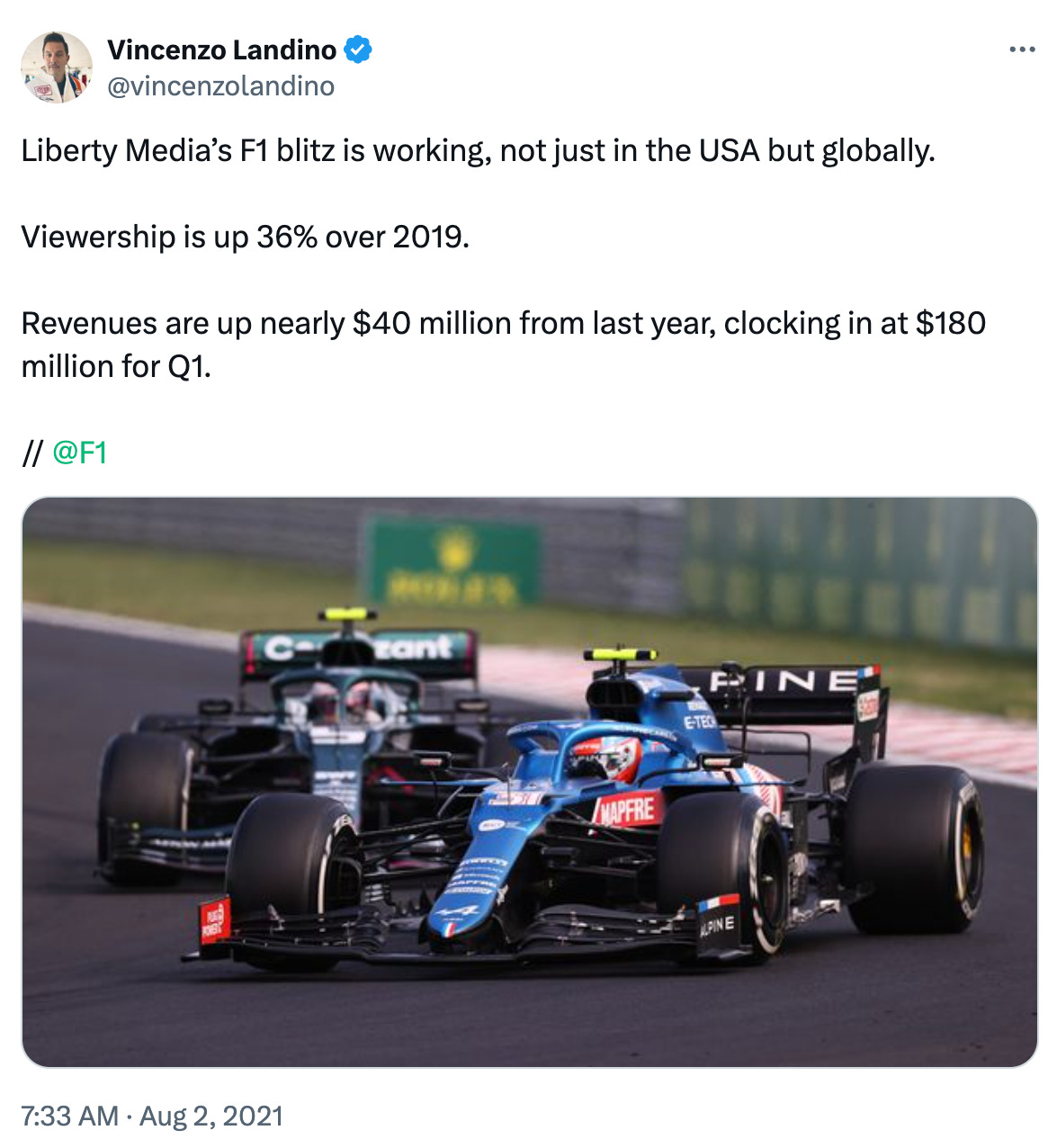This Ain't Bernie's F1
The Blitz is Working
We’re exploring the world of Formula 1 through a business, content, and media lens. If you’d like to read and listen to our work directly from your inbox, subscribe now.
The data in this thread from August continues to gain momentum.
The next step for Liberty Media was to lower the age of viewers and attract a newer audience to the sport.
Former Formula 1 boss, Bernie Ecclestone was notoriously against new ways of marketing, especially to younger fans. He was even quoted as saying things like:
I'd rather get to the 70-year-old guy who's got plenty of cash. So, there's no point trying to reach these kids because they won't buy any of the products here and if marketers are aiming at this audience, then maybe they should advertise with Disney.
Ecclestone famously relied on race promoters, teams, sponsors, and media to publicize the sport rather than the rights holders themselves investing money in marketing.
In 2018, that changed when Formula 1 rolled out a minute-long film ‘Engineered Insanity’, which initially rolled out over social media channels. It focused on the visceral appeal of the sport as experienced by ‘superfans’ inside a wind tunnel.
Ellie Norman, Formula 1’s appointed director of marketing and communications, told Reuters at Formula 1 that teams were supportive of the initiative.
There is definitely a sense of appreciation that for the first time Formula 1 is promoting the sport and the series itself.
The teams work incredibly hard from their team and driver perspective but there has not been something from Formula 1 that promotes the series.
Liberty Media is truly embracing the internet age.
Drivers and teams have online personas. Drive to Survive is a piece of brand content that would never have flown in Bernie’s F1. There’s personality in the content. It feels like work you want to support.
Just a couple of months back, Formula 1 released the results of the massive survey they put out earlier this year to some amazing results.
The blitz is working — and I believe it’s time for other sports to follow suit.
…but let’s not forget where we came from
It’s important not to alienate loyal fans and families.
The economics side of me says that prices will increase to meet the demand, and there will be a lot of aggravation amongst long-time fans for that.
It's not a black-and-white conversation, there's a lot of gray area, but it’s like when cellular companies give new customers all the great perks and deals while the customers who have been with a company for a decade deal with increased pricing to offset those specials and deals.
Rights holders and promoters have to remember that this increased hype cannot last forever, and then it's back to the drawing board again. By leading with empathy, they can harness the true power of the loyal fanbase (read Kevin Kelly's essay "1000 True Fans": https://kk.org/thetechnium/1000-true-fans/).
I've always said sports is about family and if F1 and race promoters come across this post, remember that by making events affordable and engaging for the loyal fans and families, you organically inspire generations to come without the need for gimmicky buzz.
Lewis Hamilton on Qatar
Lewis had these words to say about racing in Qatar and the duty he feels for raising awareness for equality issues:
We’re aware there are issues in these places that we’re going to. But [Qatar] seems to be deemed as one of the worst in this part of the world.
As sports go to these places, they are duty bound to raise awareness for these issues.
These places need scrutiny. It needs the media to speak about these things. Equal rights is a serious issue.
I am aware that in this place they are trying to make steps and it can't change overnight.
If we are coming to these places, we need to be raising the profile of the situation. One person can only make a certain amount of small difference but collectively we can have a bigger impact.
Do I wish that more sportsmen and women spoke out on these issues? Yes.
I have been to a lot of these countries and have been ignorant, been unconscious of some of the problems in some of the places.
It's down to whether you decide to educate yourself and hold the sport more accountable and make sure the sport is actually doing something about it when it goes to these places.
That's why I've tried to raise my voice, but there are far brighter people that are knowledgeable on these issues that are trying to fight them in the background.
But I still think we can bring a spotlight to it and create that scrutiny and that pressure that can hopefully create change.
Business of Speed is a weekly newsletter that explores the world of business, money, and content in Formula 1.
Subscribe now if you would like to join more than 33,000 other industry executives, sports fans, and pro athletes who receive it instantly to their inbox.



